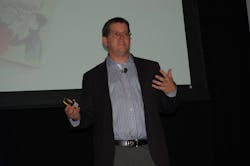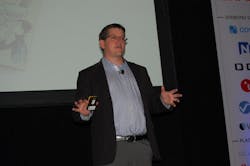So I listened to a great presentation by Will Hickie yesterday, the chief data scientist for Lixar, a firm that specializes in database management, e-commerce, and a host of other information-related services.
For starters, he hates the term “data scientists” because Hickie believes it only loosely describes what he and others in the field actually do – which is work with complex algorithms to find, in his words, “predictable outcomes.”
“I’ve actually literally burned out three computers, but not in the way you think,” Hickie explained. “I really just use them as giant calculators.”
He also finds it “just shocking” how we’ve become in his words “desensitized” to the enormous data capability we have today.
“You can type an English phrase into Google and it will return that phrase in almost any other language almost instantly,” Hickie said. “We can canvass almost the entire body of human knowledge from our phones.”
What does this mean for transportation? Hickie pointed to Tesla’s recent over-the-air (OTA) software update that provided “autopilot” functionality its cars.
“Think about that: a global update of that magnitude needs a communication network capable of transmitting that data seamlessly, to vehicles that can receive it and automatically integrate it,” he stressed. “When their customers got into their cars the next morning, they were not the same vehicle anymore; the outside looked the same, but they could do things they could not before. That’s the power we have today.”
Hickie (at right) explained to me that, in terms of transportation, this is not all just fo“Think of certain stretches of road where if you go a certain speed – say 35 miles per hour – you will reach every intersection when the traffic light is green,” he said. “Now who wants to do all the number crunching in their head to achieve that? You just want to get from point A to point B as easily as possible. That’s the role of algorithms: to find value in that data.”
The same goes for navigation systems. “What I don’t like is all the clutter on my GPS navigation screen. For example, just show me restaurants only when I am hungry,” Hickie noted. “Just show me the information when I need it.”
The end goal, then, is to use algorithms and data science to create “little brains” for cars and trucks so we can ask them questions about problems we can’t hope to understand.
“If we can get computers to learn about, say, truck maintenance, then we can start asking them questions that provide value to us,” Hickie noted. “When will we need to replace a part based on the vehicle’s usage, or will a more costly part be cheaper overall if it lasts longer?” Those “little brains” can answer such questions because they are constantly learning, constantly collecting and analyzing new data, then calculating new answers.
“Those brains keep track of how your car is working, how you are driving it, and how it will extend or reduce the lifespan of certain components based on those factors, which are constantly changing,” he pointed out. “And the growth of such capability is not linear; it’s exponential.”
Whoa. That’s certainly something to keep in the back of your mind as we continue to delve into “big data” in the trucking world.

